Analysis of US and England Healthcare Policies: A Comparison
VerifiedAdded on 2020/10/05
|7
|1401
|157
Report
AI Summary
This report provides a comparative analysis of the healthcare systems in the United States and England, focusing on policy standards, similarities, and differences. It examines the structure of the National Health Service (NHS) in England, including its governance, funding, and policy-making processes, contrasting it with the privatized US healthcare system. The report highlights key differences such as the socialist approach in England versus the capitalistic approach in the US, the role of government funding, and the impact on patient care and costs. It also explores future aspects of the US healthcare system, including the potential effects of the Affordable Care Act and the need for policy reforms to address healthcare inequalities. The analysis extends to the concept of universality in healthcare, comparing the two systems' approaches and emphasizing the need for the US to consider reforms based on the England model. The report concludes by summarizing the key findings and advocating for the US to learn from the England's healthcare system.
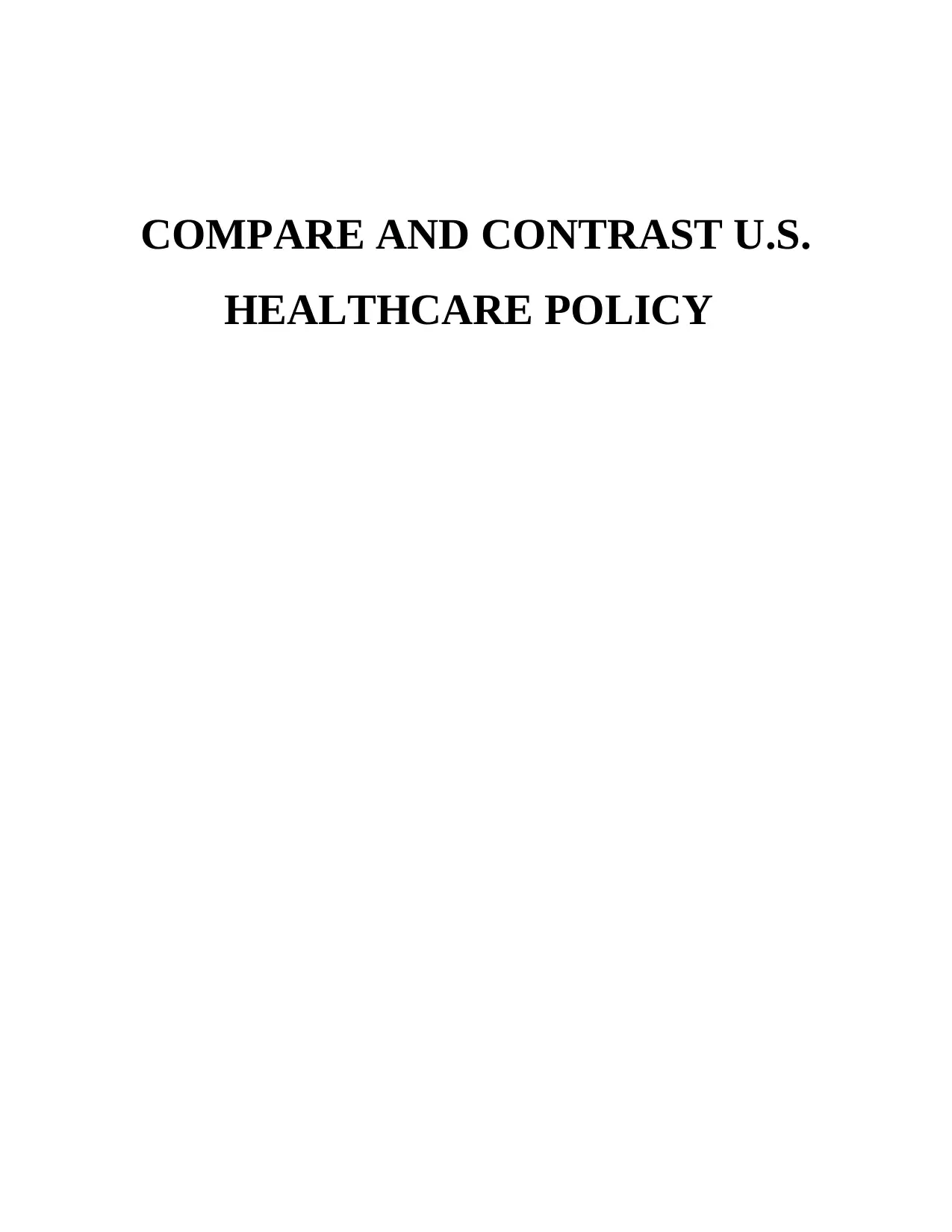
COMPARE AND CONTRAST U.S.
HEALTHCARE POLICY
HEALTHCARE POLICY
Paraphrase This Document
Need a fresh take? Get an instant paraphrase of this document with our AI Paraphraser
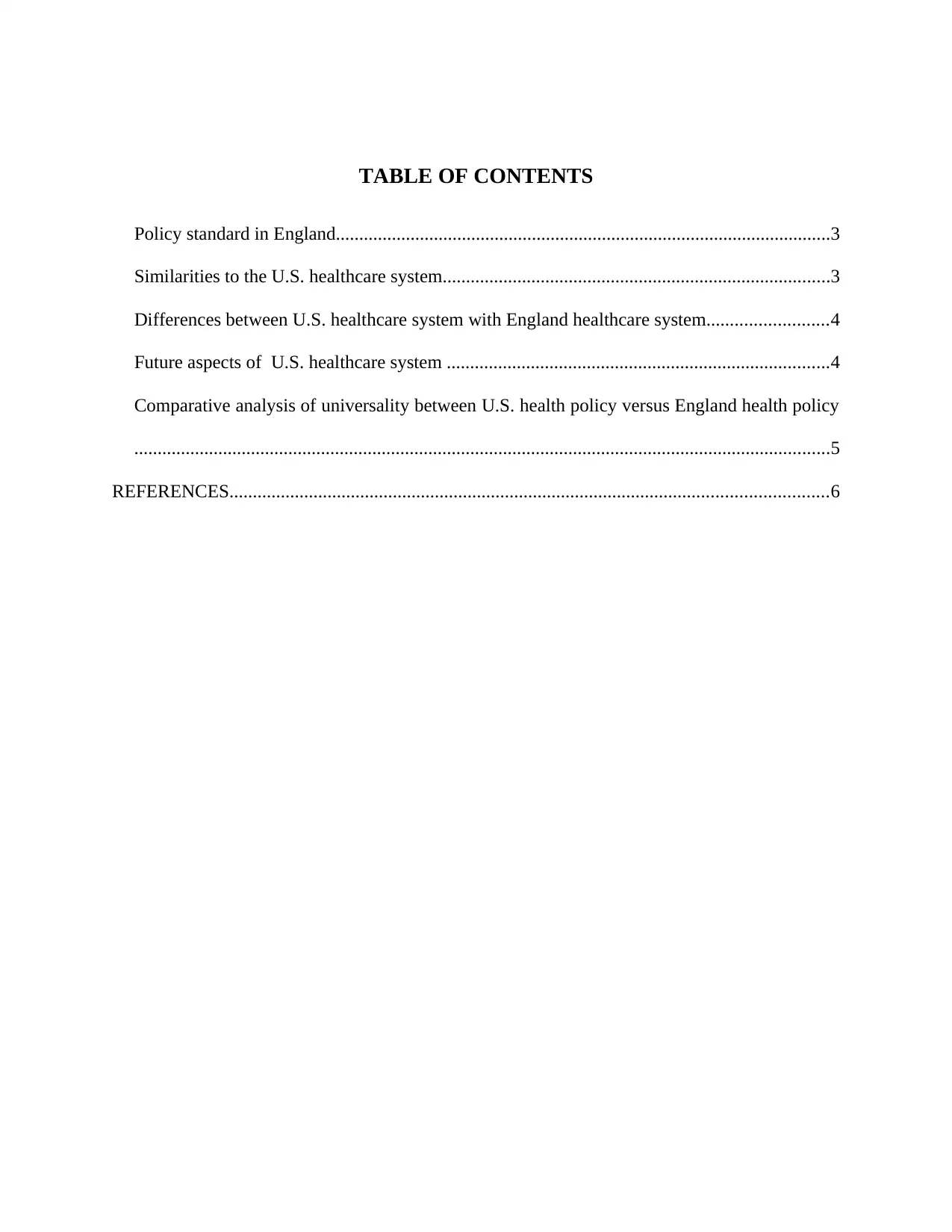
TABLE OF CONTENTS
Policy standard in England..........................................................................................................3
Similarities to the U.S. healthcare system...................................................................................3
Differences between U.S. healthcare system with England healthcare system..........................4
Future aspects of U.S. healthcare system ..................................................................................4
Comparative analysis of universality between U.S. health policy versus England health policy
.....................................................................................................................................................5
REFERENCES................................................................................................................................6
Policy standard in England..........................................................................................................3
Similarities to the U.S. healthcare system...................................................................................3
Differences between U.S. healthcare system with England healthcare system..........................4
Future aspects of U.S. healthcare system ..................................................................................4
Comparative analysis of universality between U.S. health policy versus England health policy
.....................................................................................................................................................5
REFERENCES................................................................................................................................6
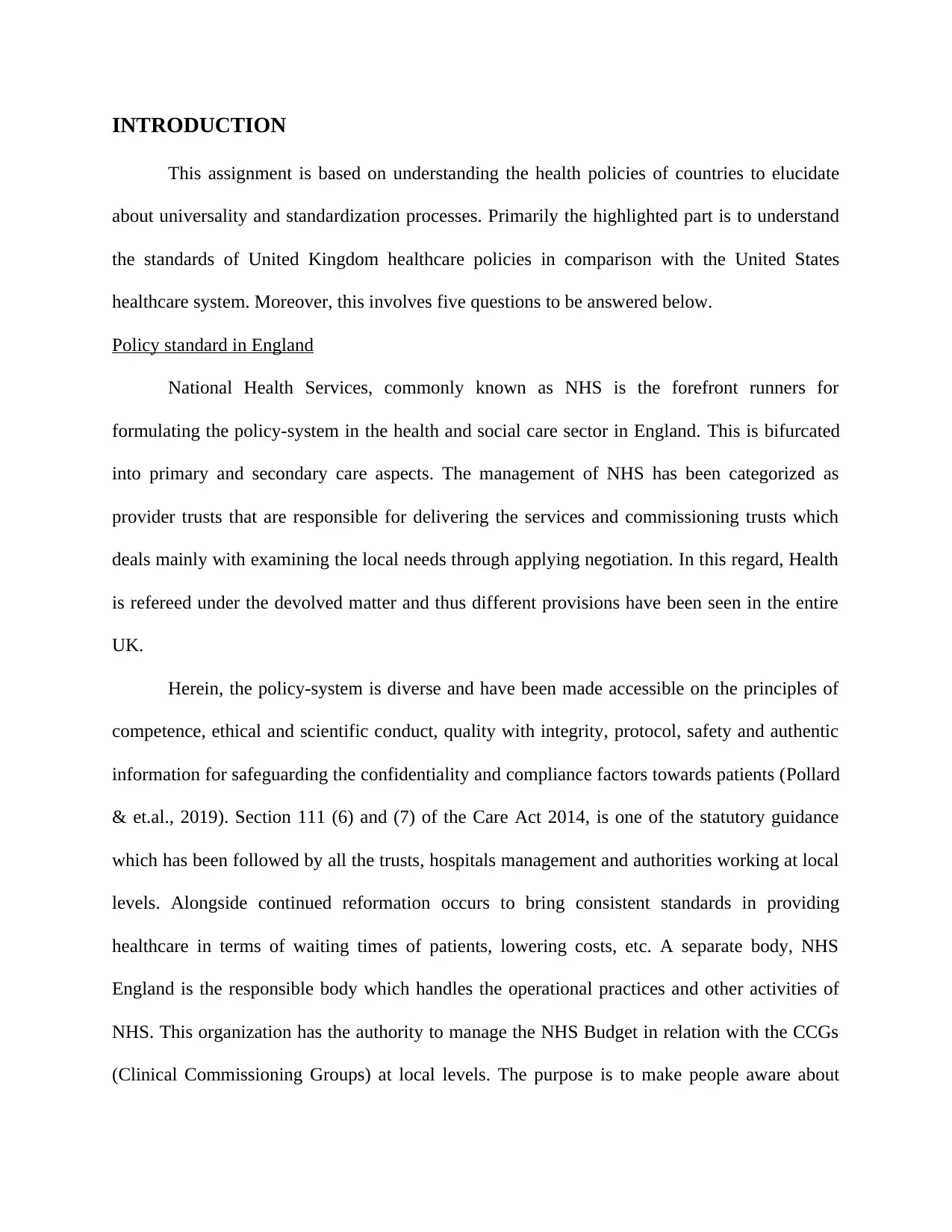
INTRODUCTION
This assignment is based on understanding the health policies of countries to elucidate
about universality and standardization processes. Primarily the highlighted part is to understand
the standards of United Kingdom healthcare policies in comparison with the United States
healthcare system. Moreover, this involves five questions to be answered below.
Policy standard in England
National Health Services, commonly known as NHS is the forefront runners for
formulating the policy-system in the health and social care sector in England. This is bifurcated
into primary and secondary care aspects. The management of NHS has been categorized as
provider trusts that are responsible for delivering the services and commissioning trusts which
deals mainly with examining the local needs through applying negotiation. In this regard, Health
is refereed under the devolved matter and thus different provisions have been seen in the entire
UK.
Herein, the policy-system is diverse and have been made accessible on the principles of
competence, ethical and scientific conduct, quality with integrity, protocol, safety and authentic
information for safeguarding the confidentiality and compliance factors towards patients (Pollard
& et.al., 2019). Section 111 (6) and (7) of the Care Act 2014, is one of the statutory guidance
which has been followed by all the trusts, hospitals management and authorities working at local
levels. Alongside continued reformation occurs to bring consistent standards in providing
healthcare in terms of waiting times of patients, lowering costs, etc. A separate body, NHS
England is the responsible body which handles the operational practices and other activities of
NHS. This organization has the authority to manage the NHS Budget in relation with the CCGs
(Clinical Commissioning Groups) at local levels. The purpose is to make people aware about
This assignment is based on understanding the health policies of countries to elucidate
about universality and standardization processes. Primarily the highlighted part is to understand
the standards of United Kingdom healthcare policies in comparison with the United States
healthcare system. Moreover, this involves five questions to be answered below.
Policy standard in England
National Health Services, commonly known as NHS is the forefront runners for
formulating the policy-system in the health and social care sector in England. This is bifurcated
into primary and secondary care aspects. The management of NHS has been categorized as
provider trusts that are responsible for delivering the services and commissioning trusts which
deals mainly with examining the local needs through applying negotiation. In this regard, Health
is refereed under the devolved matter and thus different provisions have been seen in the entire
UK.
Herein, the policy-system is diverse and have been made accessible on the principles of
competence, ethical and scientific conduct, quality with integrity, protocol, safety and authentic
information for safeguarding the confidentiality and compliance factors towards patients (Pollard
& et.al., 2019). Section 111 (6) and (7) of the Care Act 2014, is one of the statutory guidance
which has been followed by all the trusts, hospitals management and authorities working at local
levels. Alongside continued reformation occurs to bring consistent standards in providing
healthcare in terms of waiting times of patients, lowering costs, etc. A separate body, NHS
England is the responsible body which handles the operational practices and other activities of
NHS. This organization has the authority to manage the NHS Budget in relation with the CCGs
(Clinical Commissioning Groups) at local levels. The purpose is to make people aware about
⊘ This is a preview!⊘
Do you want full access?
Subscribe today to unlock all pages.

Trusted by 1+ million students worldwide
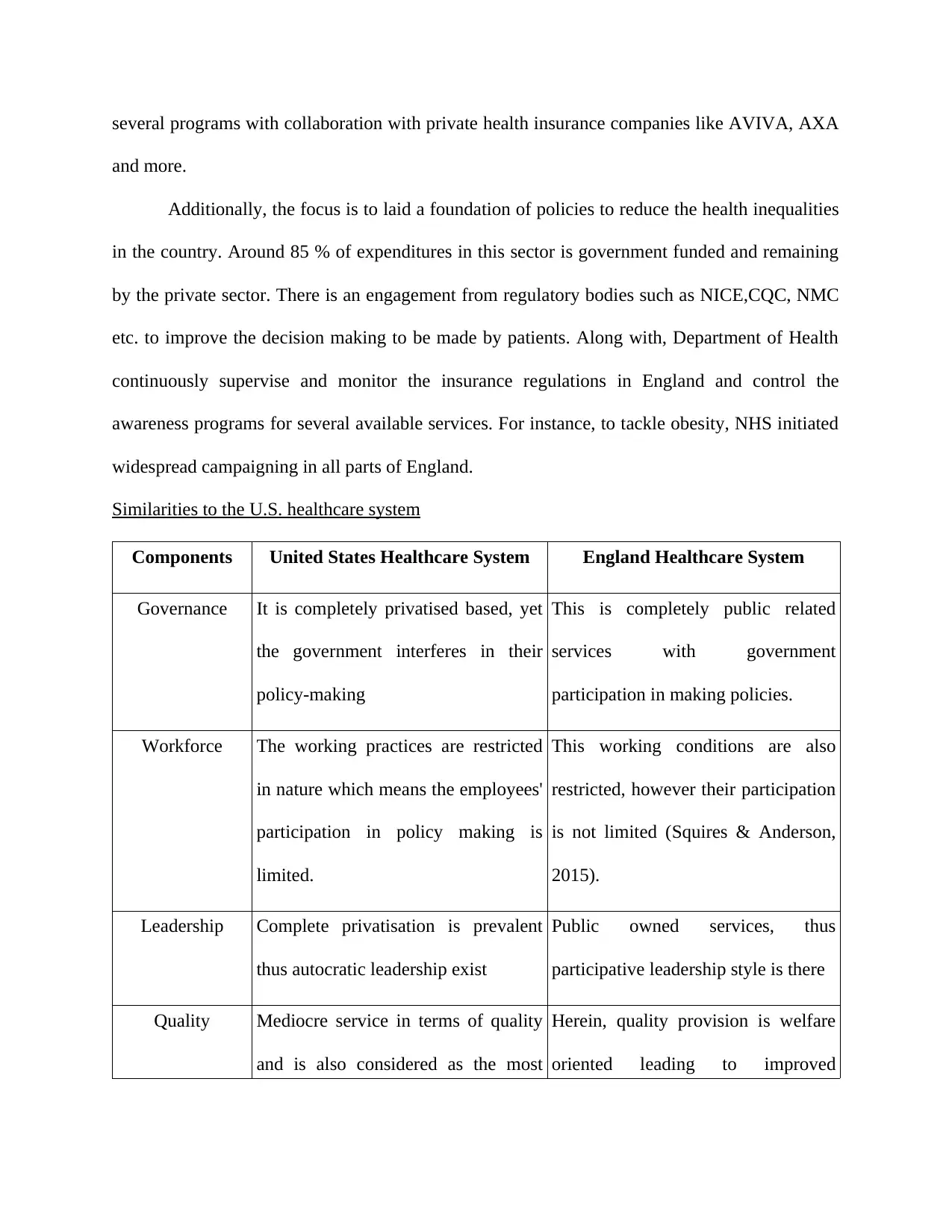
several programs with collaboration with private health insurance companies like AVIVA, AXA
and more.
Additionally, the focus is to laid a foundation of policies to reduce the health inequalities
in the country. Around 85 % of expenditures in this sector is government funded and remaining
by the private sector. There is an engagement from regulatory bodies such as NICE,CQC, NMC
etc. to improve the decision making to be made by patients. Along with, Department of Health
continuously supervise and monitor the insurance regulations in England and control the
awareness programs for several available services. For instance, to tackle obesity, NHS initiated
widespread campaigning in all parts of England.
Similarities to the U.S. healthcare system
Components United States Healthcare System England Healthcare System
Governance It is completely privatised based, yet
the government interferes in their
policy-making
This is completely public related
services with government
participation in making policies.
Workforce The working practices are restricted
in nature which means the employees'
participation in policy making is
limited.
This working conditions are also
restricted, however their participation
is not limited (Squires & Anderson,
2015).
Leadership Complete privatisation is prevalent
thus autocratic leadership exist
Public owned services, thus
participative leadership style is there
Quality Mediocre service in terms of quality
and is also considered as the most
Herein, quality provision is welfare
oriented leading to improved
and more.
Additionally, the focus is to laid a foundation of policies to reduce the health inequalities
in the country. Around 85 % of expenditures in this sector is government funded and remaining
by the private sector. There is an engagement from regulatory bodies such as NICE,CQC, NMC
etc. to improve the decision making to be made by patients. Along with, Department of Health
continuously supervise and monitor the insurance regulations in England and control the
awareness programs for several available services. For instance, to tackle obesity, NHS initiated
widespread campaigning in all parts of England.
Similarities to the U.S. healthcare system
Components United States Healthcare System England Healthcare System
Governance It is completely privatised based, yet
the government interferes in their
policy-making
This is completely public related
services with government
participation in making policies.
Workforce The working practices are restricted
in nature which means the employees'
participation in policy making is
limited.
This working conditions are also
restricted, however their participation
is not limited (Squires & Anderson,
2015).
Leadership Complete privatisation is prevalent
thus autocratic leadership exist
Public owned services, thus
participative leadership style is there
Quality Mediocre service in terms of quality
and is also considered as the most
Herein, quality provision is welfare
oriented leading to improved
Paraphrase This Document
Need a fresh take? Get an instant paraphrase of this document with our AI Paraphraser
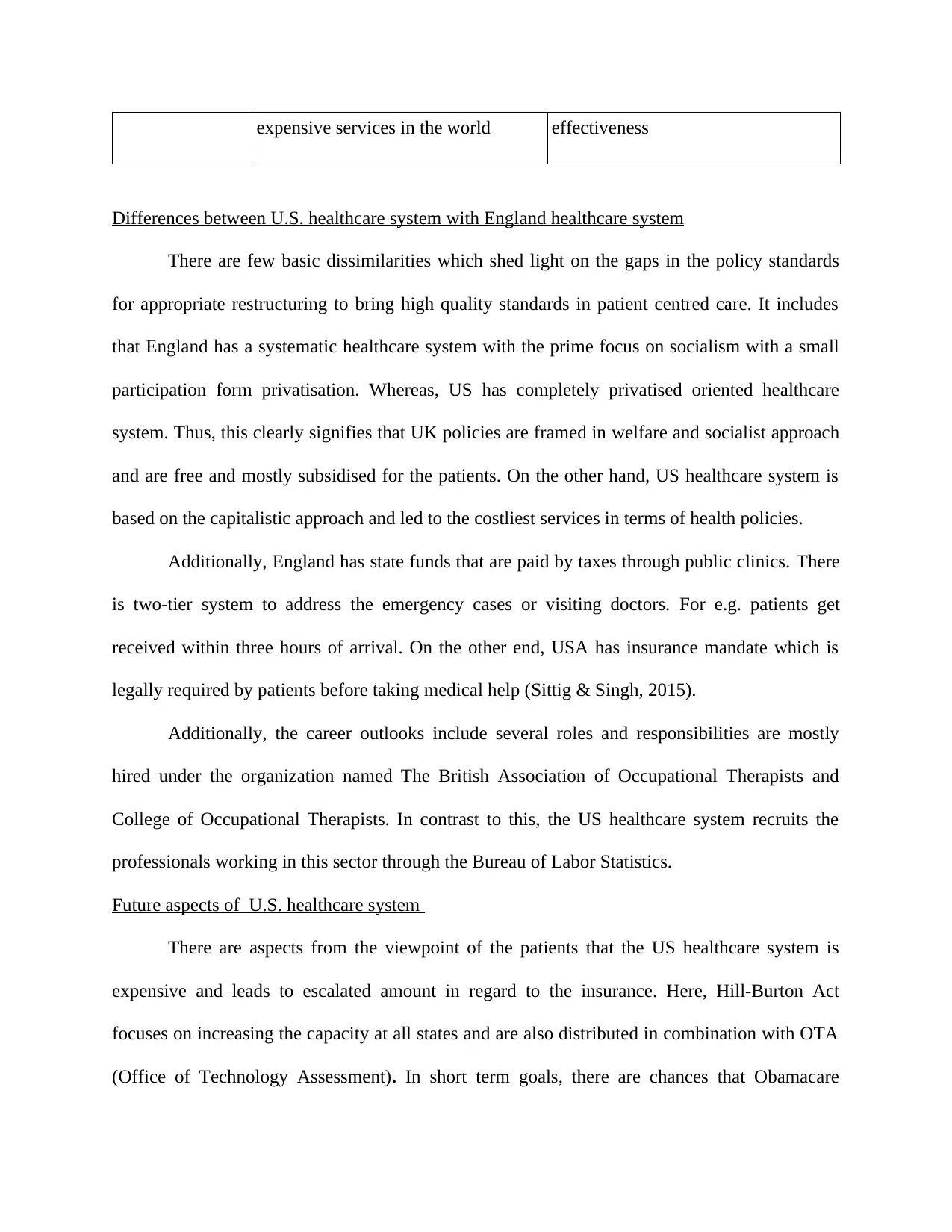
expensive services in the world effectiveness
Differences between U.S. healthcare system with England healthcare system
There are few basic dissimilarities which shed light on the gaps in the policy standards
for appropriate restructuring to bring high quality standards in patient centred care. It includes
that England has a systematic healthcare system with the prime focus on socialism with a small
participation form privatisation. Whereas, US has completely privatised oriented healthcare
system. Thus, this clearly signifies that UK policies are framed in welfare and socialist approach
and are free and mostly subsidised for the patients. On the other hand, US healthcare system is
based on the capitalistic approach and led to the costliest services in terms of health policies.
Additionally, England has state funds that are paid by taxes through public clinics. There
is two-tier system to address the emergency cases or visiting doctors. For e.g. patients get
received within three hours of arrival. On the other end, USA has insurance mandate which is
legally required by patients before taking medical help (Sittig & Singh, 2015).
Additionally, the career outlooks include several roles and responsibilities are mostly
hired under the organization named The British Association of Occupational Therapists and
College of Occupational Therapists. In contrast to this, the US healthcare system recruits the
professionals working in this sector through the Bureau of Labor Statistics.
Future aspects of U.S. healthcare system
There are aspects from the viewpoint of the patients that the US healthcare system is
expensive and leads to escalated amount in regard to the insurance. Here, Hill-Burton Act
focuses on increasing the capacity at all states and are also distributed in combination with OTA
(Office of Technology Assessment). In short term goals, there are chances that Obamacare
Differences between U.S. healthcare system with England healthcare system
There are few basic dissimilarities which shed light on the gaps in the policy standards
for appropriate restructuring to bring high quality standards in patient centred care. It includes
that England has a systematic healthcare system with the prime focus on socialism with a small
participation form privatisation. Whereas, US has completely privatised oriented healthcare
system. Thus, this clearly signifies that UK policies are framed in welfare and socialist approach
and are free and mostly subsidised for the patients. On the other hand, US healthcare system is
based on the capitalistic approach and led to the costliest services in terms of health policies.
Additionally, England has state funds that are paid by taxes through public clinics. There
is two-tier system to address the emergency cases or visiting doctors. For e.g. patients get
received within three hours of arrival. On the other end, USA has insurance mandate which is
legally required by patients before taking medical help (Sittig & Singh, 2015).
Additionally, the career outlooks include several roles and responsibilities are mostly
hired under the organization named The British Association of Occupational Therapists and
College of Occupational Therapists. In contrast to this, the US healthcare system recruits the
professionals working in this sector through the Bureau of Labor Statistics.
Future aspects of U.S. healthcare system
There are aspects from the viewpoint of the patients that the US healthcare system is
expensive and leads to escalated amount in regard to the insurance. Here, Hill-Burton Act
focuses on increasing the capacity at all states and are also distributed in combination with OTA
(Office of Technology Assessment). In short term goals, there are chances that Obamacare
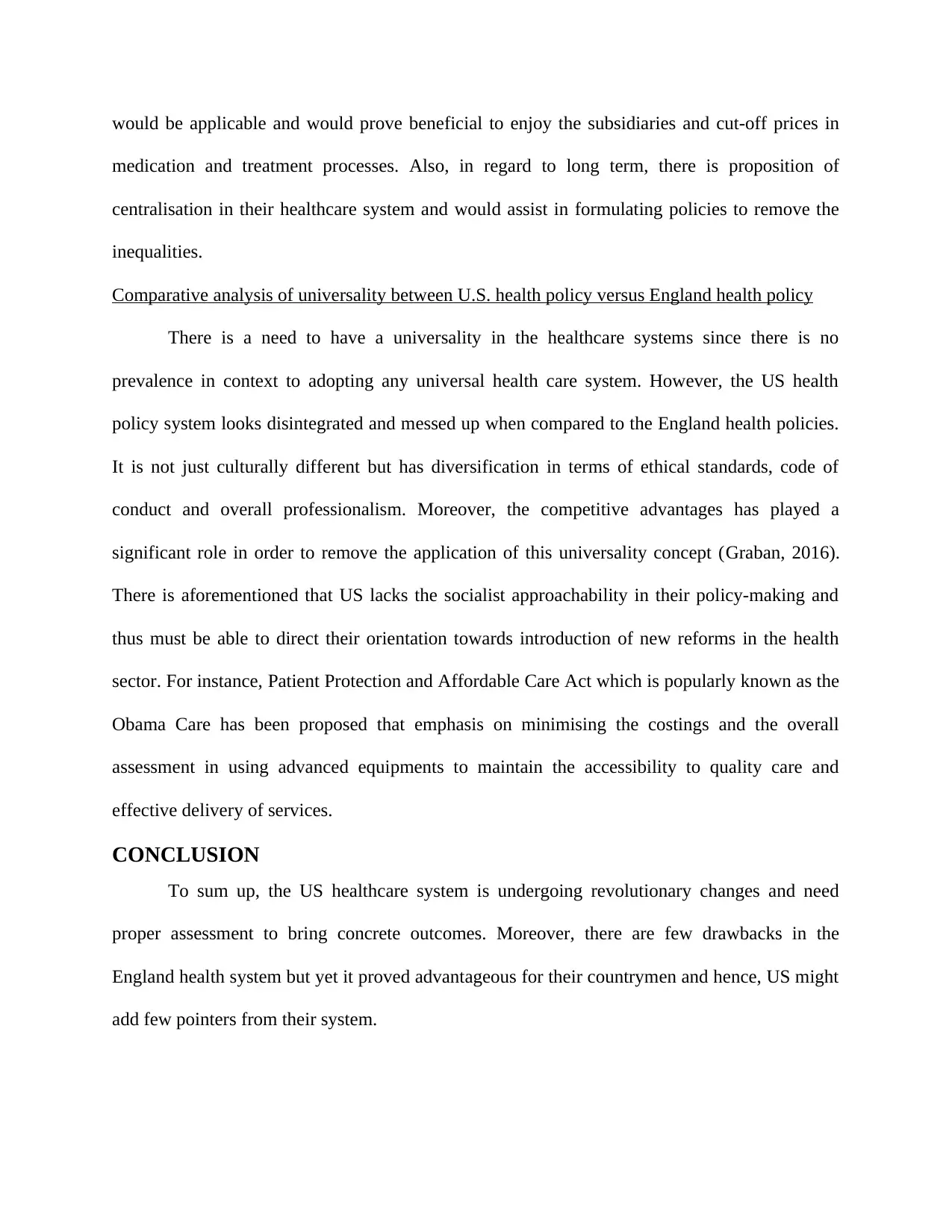
would be applicable and would prove beneficial to enjoy the subsidiaries and cut-off prices in
medication and treatment processes. Also, in regard to long term, there is proposition of
centralisation in their healthcare system and would assist in formulating policies to remove the
inequalities.
Comparative analysis of universality between U.S. health policy versus England health policy
There is a need to have a universality in the healthcare systems since there is no
prevalence in context to adopting any universal health care system. However, the US health
policy system looks disintegrated and messed up when compared to the England health policies.
It is not just culturally different but has diversification in terms of ethical standards, code of
conduct and overall professionalism. Moreover, the competitive advantages has played a
significant role in order to remove the application of this universality concept (Graban, 2016).
There is aforementioned that US lacks the socialist approachability in their policy-making and
thus must be able to direct their orientation towards introduction of new reforms in the health
sector. For instance, Patient Protection and Affordable Care Act which is popularly known as the
Obama Care has been proposed that emphasis on minimising the costings and the overall
assessment in using advanced equipments to maintain the accessibility to quality care and
effective delivery of services.
CONCLUSION
To sum up, the US healthcare system is undergoing revolutionary changes and need
proper assessment to bring concrete outcomes. Moreover, there are few drawbacks in the
England health system but yet it proved advantageous for their countrymen and hence, US might
add few pointers from their system.
medication and treatment processes. Also, in regard to long term, there is proposition of
centralisation in their healthcare system and would assist in formulating policies to remove the
inequalities.
Comparative analysis of universality between U.S. health policy versus England health policy
There is a need to have a universality in the healthcare systems since there is no
prevalence in context to adopting any universal health care system. However, the US health
policy system looks disintegrated and messed up when compared to the England health policies.
It is not just culturally different but has diversification in terms of ethical standards, code of
conduct and overall professionalism. Moreover, the competitive advantages has played a
significant role in order to remove the application of this universality concept (Graban, 2016).
There is aforementioned that US lacks the socialist approachability in their policy-making and
thus must be able to direct their orientation towards introduction of new reforms in the health
sector. For instance, Patient Protection and Affordable Care Act which is popularly known as the
Obama Care has been proposed that emphasis on minimising the costings and the overall
assessment in using advanced equipments to maintain the accessibility to quality care and
effective delivery of services.
CONCLUSION
To sum up, the US healthcare system is undergoing revolutionary changes and need
proper assessment to bring concrete outcomes. Moreover, there are few drawbacks in the
England health system but yet it proved advantageous for their countrymen and hence, US might
add few pointers from their system.
⊘ This is a preview!⊘
Do you want full access?
Subscribe today to unlock all pages.

Trusted by 1+ million students worldwide
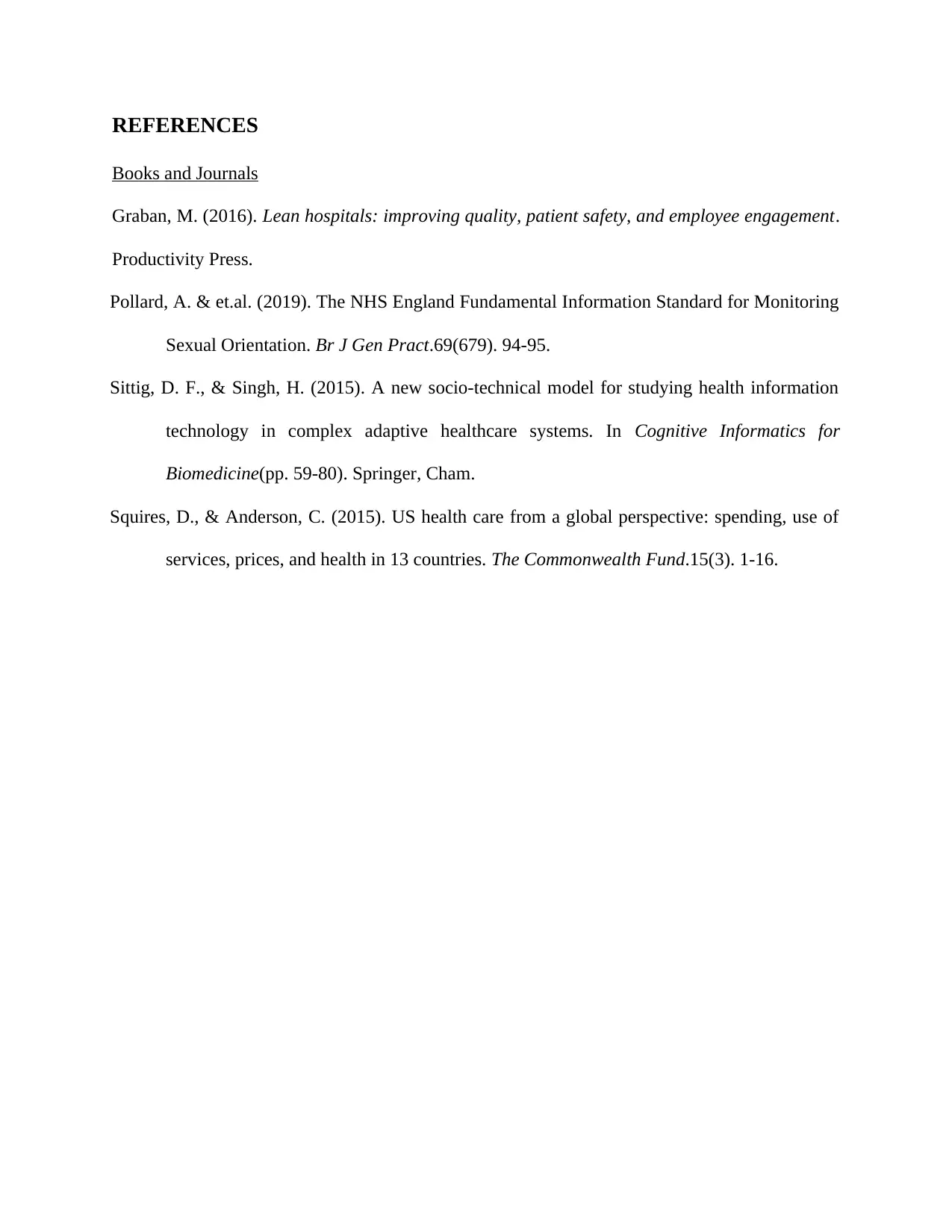
REFERENCES
Books and Journals
Graban, M. (2016). Lean hospitals: improving quality, patient safety, and employee engagement.
Productivity Press.
Pollard, A. & et.al. (2019). The NHS England Fundamental Information Standard for Monitoring
Sexual Orientation. Br J Gen Pract.69(679). 94-95.
Sittig, D. F., & Singh, H. (2015). A new socio-technical model for studying health information
technology in complex adaptive healthcare systems. In Cognitive Informatics for
Biomedicine(pp. 59-80). Springer, Cham.
Squires, D., & Anderson, C. (2015). US health care from a global perspective: spending, use of
services, prices, and health in 13 countries. The Commonwealth Fund.15(3). 1-16.
Books and Journals
Graban, M. (2016). Lean hospitals: improving quality, patient safety, and employee engagement.
Productivity Press.
Pollard, A. & et.al. (2019). The NHS England Fundamental Information Standard for Monitoring
Sexual Orientation. Br J Gen Pract.69(679). 94-95.
Sittig, D. F., & Singh, H. (2015). A new socio-technical model for studying health information
technology in complex adaptive healthcare systems. In Cognitive Informatics for
Biomedicine(pp. 59-80). Springer, Cham.
Squires, D., & Anderson, C. (2015). US health care from a global perspective: spending, use of
services, prices, and health in 13 countries. The Commonwealth Fund.15(3). 1-16.
1 out of 7
Related Documents
Your All-in-One AI-Powered Toolkit for Academic Success.
+13062052269
info@desklib.com
Available 24*7 on WhatsApp / Email
![[object Object]](/_next/static/media/star-bottom.7253800d.svg)
Unlock your academic potential
Copyright © 2020–2026 A2Z Services. All Rights Reserved. Developed and managed by ZUCOL.





